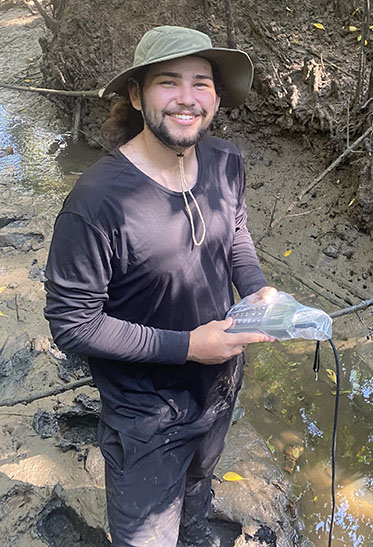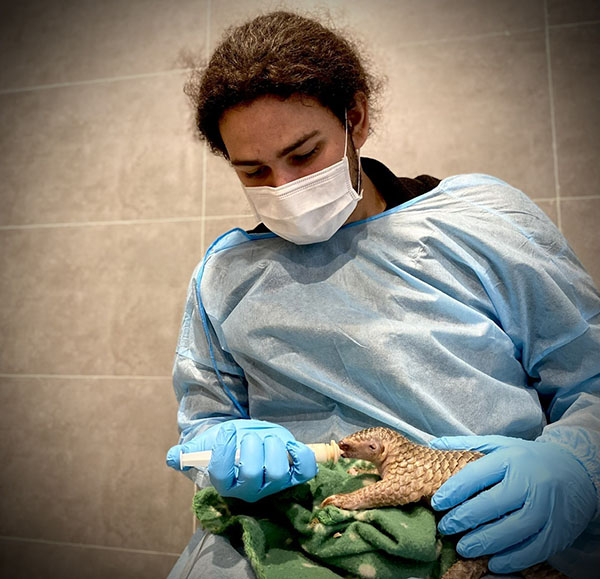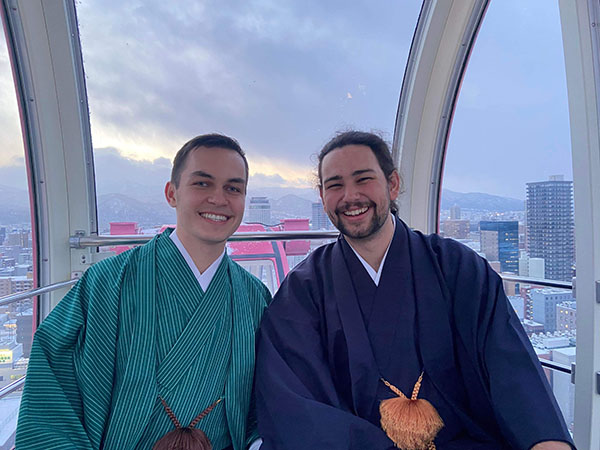Third-year Bachelor of Science student at Griffith University, Jordan McGrath has a passion for global conservation and using his mathematical mind to solve environmental problems.
His study fields are mathematics and wildlife biology, so when he applied for a New Colombo Plan (NCP) Scholarship, he wanted an experience that combined them both.
And just over 14 months later, with time spent in Singapore, Vietnam and Japan, he says the scholarship has ticked all the boxes.
Jordan began his New Colombo Plan experience in Singapore, where he studied and interned for six months at Singapore National University (NUS), and the university's Centre for Nature Based Climate Solutions.
"In Singapore I was working with a few PhD students on data analysis and field work for projects that examined mangrove forests, seagrass meadows and inter-tidal zones to work out carbon estimations for carbon crediting," he says.
"I also picked up a project in a theoretical ecology lab at NUS on population viability modelling focused on a pangolin species, which had a great synergy with what came next in Vietnam."
Jordan spent four months in Vietnam immersed in wildlife conservation at a rural centre specialising in pangolin and small carnivore rescue and breeding programs.
He observed the nocturnal behaviours of two species – the Chinese and Sunda pangolins, documenting health and well-being indicators.
"Pangolins are under threat from the illegal wildlife trade where they are sold for both their scales and their flesh, both prized used in traditional medicine, while the flesh is considered a delicacy," he says.
"Statistically you could argue this kind of work is a drop in the ocean when it comes to protecting a species, but I found it invaluable.
"When you are working in the field gathering data you learn about the variables that make the big picture data divergent or less reliable and that teaches you to build in an allowance for levels of error in the modelling you create.
"These sorts of centres are also sustaining successful breeding programs, which are important in preserving species."
He also had a chance to engage with a range of other rescued animals during his time in Vietnam – from two "rather sweet" female small-pawed otters, to civets, binturongs (bear cats) and water dragons.
"We were co-located with a range of rescue facilities – right next door there was a primate rescue centre, one for turtles, and a bear rescue centre, so I really did get to see a wide range of work being done to protect wildlife."
Jordan says adding on three months in Japan at the end of his NCP experience gave him the opportunity to extend his high school Japanese language education while also getting a perspective on Japanese conservation efforts at a bear research centre.
"It's incredibly rewarding learning a language in country, particularly for me in Japan, which has a real concentration of mathematics specialists – I was able make the most of that," he says.
A Lunga Kija man, with family roots in the north of Western Australia, Jordan says one of the most important things he has taken away from the experience is emotional resilience.
"You learn a lot of things about the science, about how things work in different countries, about global challenges, but my deepest learning was emotional," he says.
"I understood, like never before, just how much I rely on my friends and family, and I think I have come back with an increased motivation to take things more seriously.
"I also had the chance to talk to people about Aboriginal culture, something that I often found people knew very little about.
"That helped me reflect on the importance of Indigenous knowledge and where and how that can be applied to protect the environment.
"At the same time, the NCP Scholarship opened up the world. I have made friendships and connections not only with the people I worked with in three countries, but with experts – vets, scientists, ecology field workers – from around the world who have also come to these places to work on environmental problems.
"That has been really special."
Now back in Australia and completing the final year of his degree, Jordan has wasted no time in getting to work on something new.
Employed at an environmental consultancy, Ecosure, he is working on managing and finding solutions to the unhealthy movement of Ibis populations at landfills and other locations.
"We all joke about 'bin-chickens', but the Australian Ibis is increasingly in that space where humans and wildlife collide, and these are the sorts of problems I want to help solve," Jordan says.
"My NCP experience has given me more tools to be effective in doing that."




